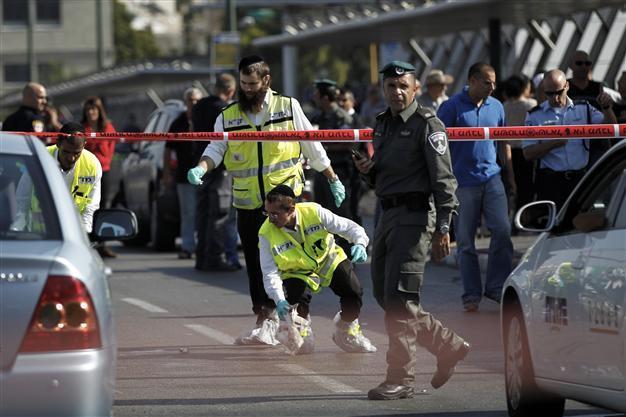Palestinian stabs Israeli soldier as tensions hit Tel Aviv
JERUSALEM - Agence France-Presse

Members of the Israeli Zaka emergency response team work at the scene of a stabbing in Tel Aviv November 10, 2014. REUTERS Photo
A Palestinian teenager stabbed and critically wounded a young Israeli soldier on Nov. 10 as unrest which has already rocked Jerusalem and the north spread to coastal Tel Aviv.
Police described the incident as a "terror attack" and said the perpetrator, who was arrested shortly afterwards, was a Palestinian in his late teens from the northern West Bank who had been staying in Israel illegally.
It was the first time Israel's hedonistic commercial capital has been affected by the current wave of violence that has gripped annexed east Jerusalem for months and spread after police shot dead a young Arab-Israeli during a routine arrest operation.
Saturday's shooting sparked two days of clashes in Arab towns in northern and central Israel, prompting police to raise the nationwide alert to one below the highest level in anticipation of further unrest.
Monday's attack saw the Palestinian stab an Israeli soldier aged about 20 outside HaHagana train station in southern Tel Aviv.
"It was apparently an attack with nationalist motives. The suspect is a resident of the Nablus area," police spokeswoman Luba Samri said.
The attacker was arrested while hiding in a nearby apartment building.
Emergency services spokesman Zaki Heller said the victim was "very seriously hurt", with footage from the scene showing a man lying in pools of blood.
"I got to HaHagana bridge with a friend and we saw a big man in a red sweatshirt stabbing a soldier twice, apparently someone from the air force," an eyewitness called Kobi told public radio.
The attacker was identified by family members as 17-year-old Nureddine Abu Hashiyeh from Askar refugee camp east of Nablus.
His father Khaled told AFP that his son, a painter and decorator by trade, had left for Tel Aviv on Sunday.
The attack came as Israel struggles to contain a growing wave of violence which has gripped annexed east Jerusalem for the past four months, but which has recently spread to Arab towns and villages inside the country.
Anger initially erupted in Jerusalem in early July over the murder of a Palestinian teenager by young Jewish extremists.
It has been fuelled by religious tensions at the flashpoint Al-Aqsa mosque compound, as well as by moves to expand settler presence in the occupied eastern sector of the holy city.
Since August, there have been four deadly Palestinian attacks in Jerusalem -- three of which were "hit-and-run terror attacks" which killed five Israelis -- and one attempted drive-by shooting.
All four perpetrators, who acted alone and came from east Jerusalem, were shot dead, sparking further unrest.
Since July, police have arrested some 900 Palestinians for public order offences in east Jerusalem and indicted around a third of them.
But at the weekend, the unrest spread after police shot dead a 22-year-old Arab-Israeli in Kufr Kana near the northern city of Nazareth, triggering a wave of rioting in Arab areas, some of which continued until early Monday.
Police claim the officers fired warning shots before firing directly at him.
But relatives say Kheir Hamdan was killed "in cold blood", with CCTV images apparently contradicting the official version and showing an officer shooting at him as he was backing away from the scene.
Following two days of clashes, 24 Arab-Israelis -- 10 of them minors -- were in court on Monday on charges of stone-throwing and other public order offences, police said.
Overnight, a car driven by a Jewish Israeli was stoned then torched but the driver escaped unharmed when a local resident dragged him to safety, police said.
In another incident, a home-made pipe bomb was thrown at police but failed to detonate. In response to the violence, Prime Minister Benjamin Netanyahu has ordered more police onto the streets, vowing that anyone breaking the law would be "punished severely".
"We will not tolerate disturbances and riots. We will take determined action against those who throw stones, firebombs and fireworks, and block roads, and against demonstrations that call for our destruction," he said on Sunday.
